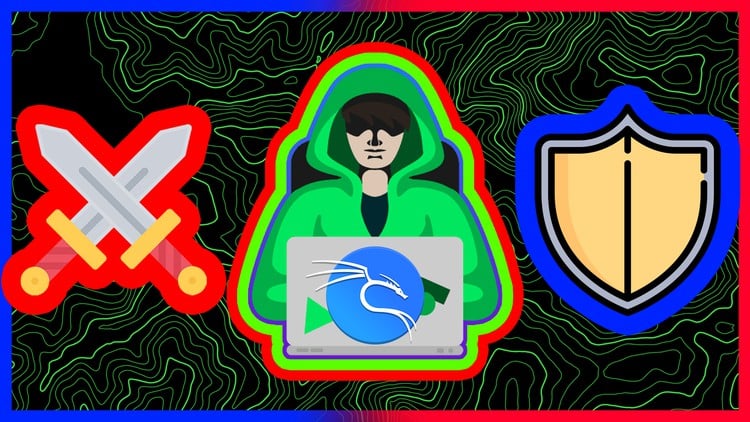
Learn ethical hacking, penetration testing, Linux tools, C++, cryptography, and real-world cybersecurity strategies NOW!
⏱️ Length: 46.1 total hours
⭐ 4.13/5 rating
👥 127,500 students
🔄 August 2025 update
Add-On Information:
Note➛ Make sure your 𝐔𝐝𝐞𝐦𝐲 cart has only this course you're going to enroll it now, Remove all other courses from the 𝐔𝐝𝐞𝐦𝐲 cart before Enrolling!
- Course Overview
- This comprehensive program equips learners to become proficient ethical hackers and cybersecurity experts, aligning directly with the rigorous CEH (Certified Ethical Hacker) certification.
- Delve into the adversarial mindset, learning to anticipate, detect, and mitigate cyber threats by mastering attacker methodologies.
- Explore the full spectrum of cybersecurity, integrating offensive penetration testing techniques with robust defensive strategies for resilient digital infrastructure.
- Gain extensive hands-on experience through practical exercises and real-world scenarios, solidifying theoretical concepts with immediate actionable skills.
- Regularly updated content, including an August 2025 revision, ensures access to the most current tools, techniques, and industry best practices.
- Designed for aspiring security professionals and IT specialists, this course bridges the gap between theoretical knowledge and practical application.
- Requirements / Prerequisites
- A foundational understanding of basic computer operations, operating systems (Windows/macOS), and common networking concepts (IP, protocols).
- Familiarity with command-line interface (CLI) navigation is beneficial, particularly for Linux environments.
- No advanced programming experience is strictly required, as relevant C++ concepts are introduced; a logical problem-solving aptitude helps.
- A stable internet connection and a computer capable of running virtual machines are essential for lab exercises.
- Skills Covered / Tools Used
- Advanced Penetration Testing Methodologies: Develop structured approaches for reconnaissance, scanning, exploitation, post-exploitation, and professional reporting.
- Exploit Development Fundamentals: Understand vulnerability leveraging and begin crafting basic exploits using C++ for deeper system interaction.
- Secure Code Analysis: Identify common coding vulnerabilities in applications and implement secure coding practices to prevent exploitation.
- Wireless Network Security: Master techniques for auditing and securing wireless networks, including WPA/WPA2 cracking and rogue AP detection.
- Web Application Penetration Testing: Explore common web vulnerabilities like SQL injection, XSS, CSRF, and utilize tools such as Burp Suite for comprehensive assessments.
- Cloud Security Principles: Understand unique security challenges in cloud environments (e.g., AWS, Azure) and strategies for securing cloud-based assets.
- Digital Forensics & Incident Response (DFIR) Basics: Gain insight into initial incident handling, evidence collection, and analysis for effective breach response.
- Practical Cryptography: Apply cryptographic concepts to secure communications, analyze weaknesses in encryption implementations, and understand protocol roles.
- Social Engineering Countermeasures: Learn to recognize and defend against human-based attacks designed to bypass technical controls.
- Network Protocol Analysis: Utilize tools like Wireshark for deep inspection of network traffic, identifying anomalies and malicious activities.
- Malware Analysis Basics: Introduction to analyzing different malware types (e.g., viruses, worms) to understand their behavior and impact.
- Automated Vulnerability Scanning: Proficiently use industry-standard scanners such as Nessus or OpenVAS to efficiently identify system and network weaknesses.
- Security Hardening Techniques: Implement best practices for securing operating systems, servers, and network devices to minimize attack surfaces.
- Advanced Linux Utility Usage: Delve into advanced Linux commands and scripting (Bash) for task automation, system monitoring, and specific security operations.
- Metasploit Framework Mastery: Gain in-depth practical skills with the Metasploit Framework for comprehensive exploitation and post-exploitation activities.
- Benefits / Outcomes
- CEH Certification Readiness: Prepare confidently for the Certified Ethical Hacker (CEH) exam, a globally recognized credential.
- High-Demand Career Opportunities: Unlock pathways to roles like Penetration Tester, Security Analyst, Ethical Hacker, and Cybersecurity Consultant.
- Practical, Real-World Skills: Acquire immediate professional applicability in cybersecurity environments, making you a valuable asset.
- Comprehensive Security Mindset: Develop the ability to think like an attacker while building robust defenses, enabling proactive threat identification.
- Enhanced Problem-Solving Capabilities: Sharpen analytical and critical thinking skills to dissect complex security challenges.
- Contribution to Organizational Security: Empower yourself to protect digital assets and critical infrastructure from sophisticated threats.
- Professional Networking Potential: Join a community of over 127,500 students, fostering opportunities for collaboration and knowledge sharing.
- Stay Ahead of Emerging Threats: The regularly updated curriculum ensures knowledge of the latest attack vectors and defense mechanisms.
- PROS
- CEH-Aligned Curriculum: Directly prepares for a prestigious industry certification, significantly boosting career prospects.
- Extensive Practical Labs: Offers significant hands-on experience, bridging theory with practical application for deep understanding.
- Comprehensive Skill Set: Covers a broad array of topics from ethical hacking and penetration testing to C++ and cryptography.
- Large and Active Student Community: Provides a vast network for peer learning and support with over 127,500 students.
- Up-to-Date Content: Regular updates, including the August 2025 revision, ensure relevance to current threats and technologies.
- High Instructor Rating: A 4.13/5 rating indicates a well-received course with effective instruction and quality content.
- CONS
- Significant Time Investment: The 46.1 total hours of content require considerable commitment, potentially challenging for those with limited free time.
Learning Tracks: English,IT & Software,Network & Security
Found It Free? Share It Fast!